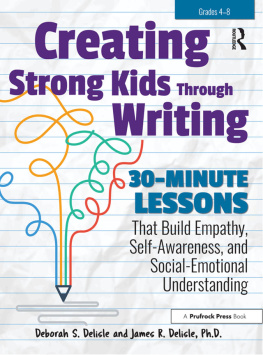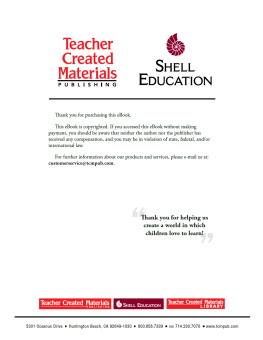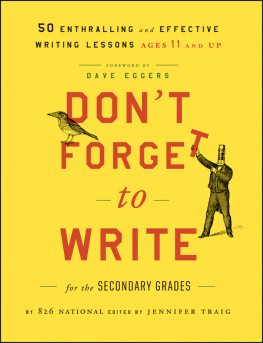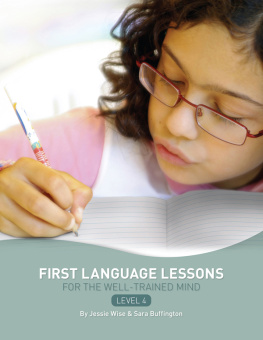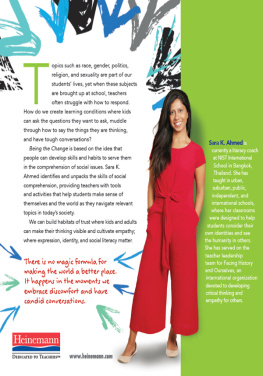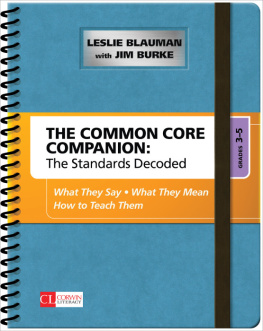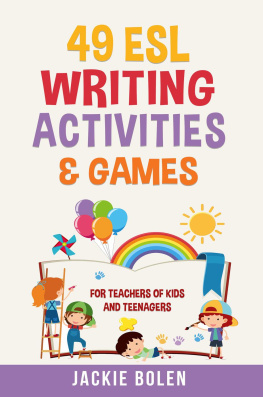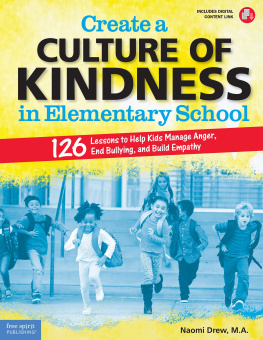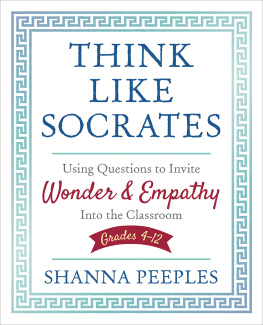
Creating Strong Kids Through Writing
Creating Strong Kids Through Writing GRADES 4-8
30-MINUTE LESSONS THAT BUILD EMPATHY, SELF-AWARENESS, AND SOCIAL-EMOTIONAL UNDERSTANDING
Deborah S. Delisle and
James R. Delisle, Ph.D.

First published in 2019 by Prufrock Press Inc.
Published in 2021 by Routledge
605 Third Avenue, New York, NY 10017
2 Park Square, Milton Park, Abingdon, Oxon OX14 4RN
Routledge is an imprint of the Taylor & Francis Group, an informa business.
Copyright 2019 by Taylor & Francis Group
All rights reserved. No part of this book may be reprinted or reproduced or utilised in any form or by any electronic, mechanical, or other means, now known or hereafter invented, including photocopying and recording, or in any information storage or retrieval system, without permission in writing from the publishers.
Notice:
Product or corporate names may be trademarks or registered trademarks, and are used only for identification and explanation without intent to infringe.
Edited by Stephanie McCauley
Cover, layout design, and illustrations by Micah Benson
ISBN-13: 978-1-0321-4168-8 (hbk)
ISBN-13: 978-1-6182-1845-2 (pbk)
DOI: 10.4324/9781003233893
TABLE OF CONTENTS
Guide
DOI: 10.4324/9781003233893-1
As students transition from their early years of schooling to young adolescence, a rush of new emotions and thoughts leads them into a period of uncertainty and exploration. They yearn to fit in and find meaning in their lives, they question their places in the world, and they can easily become self-absorbed.
This transition period is neither bad nor unexpected. Self-examination and self-doubt are important stages of growing up, and they are at the heart of this book. The lessons in Creating Strong Kids Through Writing invite students to look inward before expressing their feelings externally. Time and again, we have witnessed students respond in absolutely remarkable ways to assignments that felt personal to them. Not only have students impressed us with their work, but they also have often astounded themselves with their insights and responses. One of our students wrote on top of his writing page during one of these lessons, I never felt like this before. Although each student will respond differently to each lesson, we have found that providing space for kids to think, reflect, and ponder in a safe learning environment is important for the development of important life skills.
INCORPORATING IMPORTANT TENETS OF SOCIAL-EMOTIONAL LEARNING
Tapping into your students desire to express themselves in just one part of building strong writers in upper elementary and middle school. When writing is used as part of a larger effort to engage students in the development of social-emotional skills, we believe it is the students who do the building, not the teachers.
The Collaborative for Academic, Social, and Emotional Learning (CASEL, 2018) defined social-emotional learning as:
the process through which children and adults acquire and effectively apply the knowledge, attitudes, and skills necessary to understand and manage emotions, set and achieve positive goals, feel and show empathy for others, establish and maintain positive relationships, and make responsible decisions. (para. 1)
CASELs design, Framework for Systemic Social and Emotional Learning, identifies five core competencies that are essential to the development of social and emotional learning. These competencies are: self-awareness, self-management, responsible decision-making, relationship skills, and social awareness.
Various research studies (e.g., Elias, Ferrito, & Moceri, 2016; Zins, Bloodworth, Weissberg, & Walberg, 2004) demonstrate the importance of incorporating social-emotional learning into the daily routines of schools, including enhanced academic achievement, attitudes, behaviors, and skills. In addition, incorporating social and emotional skills has a significant return on investments (Belfield et al., 2015). However, it is only through the purposeful, deliberate, and consistent inclusion of social-emotional competencies into all curricula that the benefits will be realized. Because we believe that these competencies must be a part of lessons, and not apart from lessons, we have designed writing lessons that capture them in engaging activities that allow students to explore, reflect, and apply their feelings and attitudes in constructive ways. identifies the primary social and emotional skills that are highlighted in each of the lessons.
SEL Competencies Addressed| SEL Competency (CASEL, 2018) | Lessons That Address This Skill |
|---|
| Self-Awareness | 1,2, 3, 7, 8, 9,10,11,13,14, 20 |
| Self-Management | 5,8,13,14,17,18,19, 20 |
| Responsible Decision-Making | 5,7, 8, 9,10,11,12,13,14,16, 20 |
| Relationship Skills | 3,4, 6, 7, 9, 10,11, 12,13,14,15,17,18,19, 20 |
| Social Awareness | 1, 2, 3, 4, 5,6, 7,12,13,14,15,16,17,18,19 |
USING THIS BOOK
Each of the lessons in Creating Strong Kids Through Writing includes the following sections:
- Objective: One simple statement that identifies the main thrust of the lesson.
- Context: Provides background information on the purpose and intent of the lesson, as well as some hints from our own experience.
- Social-Emotional Connection: Ties the lesson to the important competencies and tenets of social-emotional learning.
- The Hook: Sets up the lesson in an engaging way to get students interested in the writing activity you are about to introduce.
- Inviting Students to Respond: Contains step-by-step instructions on administering the lesson, including, when appropriate, the stages of drafting, revising, and sharing final products.
- Tips to Enhance or Extend This Lesson: Allows you to consider gaining larger benefits from the lesson by expanding its scope in depth or breadth. You may consider engaging other classes or even the whole school. Such extensions demonstrate the importance of exploring students lives in relation to others outside of students immediate proximity. Additionally, these extensions support the importance of social-emotional learning in a context broader than just one classroom.
Every lesson includes sample responses written by our students that you may use as models, or adapt based on students ages and grades, to introduce the activity. You may project these sample pages onto a screen or interactive whiteboard or create hard copies for student use. The student samples we have included reflect high-quality writing. Although not every one of our students produced work of this caliber (which may be the case in your classroom), we believe these exemplars may inspire your students to create written products that demonstrate sophisticated and deep thinking.
A WORD ABOUT HOLISTIC EVALUATION
We are cognizant of the many ways in which students may be assessed in terms of their growth as writers as well as their ability to meet grade-level standards. We also recognize that assessment is an area of much debate and continued research, so we leave it to you, the teacher, to establish how your students responses should be evaluated in conjunction with your schools curriculum and expectations. Our recommendation, however, is holistic evaluation.
Next page
